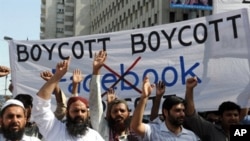Pakistani officials have ordered the country's Internet service providers to block the popular video-sharing website YouTube, saying its contains "growing sacrilegious content." The official ban against YouTube access in Pakistan comes a day after a Pakistani high court ruled to temporarily block the popular social networking website Facebook. Facebook said it is investigating the incident.
An Islamic lawyers group objected to a page on Facebook that encourages users to draw the Prophet Muhammad and post the images. Most Muslims consider any images made of the Prophet to be blasphemous.
Government officials say they are closely monitoring whether online users are posting the controversial images to other websites, and if so, they promised to extend the online restrictions.
Pakistani Foreign Ministry spokesman Abdul Basit explained the decision to reporters. "Such malicious and insulting attacks hurt the sentiments of Muslims around the world, and cannot be accepted under the guard of freedom of expression," said Basit.
There were sporadic protests throughout Pakistan, with some people demanding a permanent government ban on Facebook.
The chief executive officer of Nayatel, an Internet Service Provider in Pakistan, Wahaj-us-Siraj, said he was ordered by the authorities to put the block in place. "They say that as soon as the Facebook and YouTube remove those objectionable videos or materials, they would allow the access to those sites in the country," he said.
Blackberry services also were temporarily suspended.
Prominent Pakistani human-rights activist Farzana Bari said the Pakistani authorities are being too heavy handed. "I think this is a very irrational response. It is like treating people as they cannot make rational decisions, treating people like they are children," said Bari.
Information allegedly posted by the creators of the controversial Facebook page said it was a form of protest against threats made by a radical Muslim group against the creators of the adult-targeted U.S. cartoon television show "South Park." The radical group had threatened the show's creators for making the audience think the Prophet Muhammad was being depicted in a full body bear suit shown in an episode earlier this year. It was later revealed that the Prophet Muhammad was not hidden in the costume, although the Prophet later was depicted by a black censor bar.
.
Pakistan temporarily blocked YouTube in 2008 because a movie trailer on the site portrayed the Muslim holy text, the Koran, as a fascist book.
Angry protests also swept across Muslim countries in 2005 and 2006 after a Danish newspaper printed several caricatures of the Prophet Muhammad.




